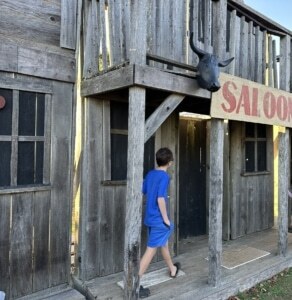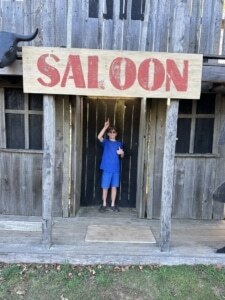Matthew Dicks's Blog, page 69
November 19, 2023
Like my mom doesn’t says…
I’m standing at a table at WBUR CitySpace, filling out a form to compete in this evening’s Moth StorySLAM.
It’s quite the questionnaire.
Questions about my name, the pronunciation of my name, contact information, demographic data, known languages, and more.
When I first began telling stories for The Moth in New York City back in July of 2011, the “form” was a small slip of paper upon which you would write your name and nothing more.
Times have certainly changed.
While completing the form, one of the Moth volunteers, who I know well, explained the process to a woman beside me. After she was finished explaining, the volunteer asked, “So? Do you want to try to tell a story tonight?”
“No,” the woman said, laughing. “Never!”
Standing beside me, a second woman said, “Don’t say that! Like my mother famously said… Never say never.”
I turned to the woman. “Your mom didn’t famously say that. ‘Never say never’ is something everyone says. We’ve been saying it forever.”
The woman stared at me for a moment before apparently realizing this was true. In just a few seconds, her expression went from confusion to realization to sadness.
I had apparently stolen this bit of pride from her.
Oh well.
I checked on the expression when I got home, just to be sure it didn’t originate with some lady in Boston. “Never say never” was first recorded in Charles Dickens’s “Pickwick Papers” in 1837 but likely had existed long before that.
So no. That lady’s mom may have spoken those words many times – probably annoyingly so – but she didn’t make them famous.
Happy to clear that up for her.

November 18, 2023
Morning and afternoon moments of joy
I played golf yesterday afternoon with a man named John. We approached the first tee box about the same time, so he asked if I would like to join him.
Honestly, I didn’t. I had limited time before a business call and a departure to Boston, so I had planned to don my headphones, listen to Springsteen, and play nine holes as quickly as possible.
But I believe in saying yes, even when I would rather say no, so I grudgingly agreed, hoping against hope John was a quick player.
We were walking down the fairway on the second hole when he asked, “So what do you do for a living?”
Always a tricky question for me, given my basketful of careers. Teacher? Author? Consultant? Business owner? Performer? Plus many more…
But since I had just left school, I said, “I’m a teacher over at Wolcott School.”
“Wolcott School?” John said. “Plato Karafelis was the principal at Wolcott School years ago.” Then, he proceeded to extol the many virtues of my former principal and current friend.
This happens a lot. I mention Plato’s name, then sit back and listen to the accolades. Many, many people remember Plato, and they always have something positive to say.
I told John that Plato and I are still friends. I visited him on Whidbey Island with my family last summer. We’ll see each other again in January for three days of golf in Florida. I had just spoken to him this week.
By now, we’d reached John’s ball. He hit his second shot, turned to me, and said, “Matthew Dicks isn’t teaching at Wolcott School anymore. Is he? He’s probably long gone, too?”
I laughed.
“You’re playing golf with him right now,” I said. “And yes, I’m still teaching at Wolcott School.”
You can imagine his surprise.
It turns out John lives next door to a family I know well. I taught both of their kids years ago and have remained in touch with the parents and the children ever since. John had gotten to know me over the years through this family, remembering much about me and my teaching. More than I would’ve expected, given he had never set foot in my classroom.
He had also just finished reading one of my novels.
“In fact,” John said. “I think you and I played golf together about ten years ago.”
It turned out to be a delightful afternoon of golf. John and I had much to discuss and lots to share. On the fifth hole, I canceled my business call so I could finish the round with John undisturbed.
It was an afternoon to remember.
Nine hours earlier, at the crack of dawn, I had played the same nine holes before work. It was a foggy morning, so as the sun rose, the sky was spectacular.
Some of the best views I’ve seen on the golf course all year. An hour later, I entered my school with a spring in my step and joy in my heart.
I said goodbye to John at the end of the round feeling the same way.
Getting outdoors, exercising, meeting new people, and spending time in nature… I can’t recommend these things enough.


November 17, 2023
A mom did a great job
In a meeting with a mother this week during parent-teacher conferences, she told me, “I did a great job” related to an aspect of her parenting.
I loved this. I love it so much, and I said so. “I love that!” I told her. “Not enough parents give themselves credit for the job they do! I wish more people would talk like that.”
I may have even used an expletive or two when expressing my appreciation.
But it’s true.
So often, parents are saddled by guilt, uncertainty, fear, and doubt when, most of the time, we’re doing a fantastic job. Our kids are happy, healthy, kind, well-adjusted human beings with flaws and foibles that have nothing at all to do with us.
They are simply human. Imperfect beings operating independently of us and sometimes in opposition to our own preferences for them. They make mistakes and do stupid things and forget everything we told them. But none of this is our fault. They are not clones or robots or made of clay, capable of being molded into exactly what we think they can or should be.
They are simply, tragically, relentlessly human.
Even if you’re allowing your child unfettered access to a phone and internet, sending them to school with four bags of Doritos, three cheese sticks, and a Snickers bar, failing to assign and enforce a reasonable bedtime, and forgetting to attend their parent-teacher conference three times this week, you’re still likely doing a great job as a parent. You’re almost certainly loving, guiding, and helping your child to find their way through this world.
Admittedly, you could probably be doing better if the list above describes you in any way, but even so, I’m confident that there are aspects of your parenting that should make you proud, and you speak, shout, and sing that pride to the world.
Parents don’t give themselves credit. I suspect that mothers need to hear this most of all, which made this mother’s statement so surprising, refreshing, and needed this week.
So don’t be afraid to give yourself credit. Don’t be ashamed to tell someone you’re crushing it as a parent. Even when every parent around is lamenting their choices, bemoaning their indecision, and obsessing over their failures, stand up. Stand out. Be that beacon of pride and positivity in a world of wallowing negativity.
Parenting can be hard. It becomes especially hard when we ignore our successes and simply focus on the failures, the possibility of failure, and the everpresent doubt and uncertainty.
You’re crushing it, parents. Tell yourself so. Speak the words aloud. Tell someone else, too. Make the world know that you’re doing a hell of a job as a parent, no matter what dumb thing your child may do today.

November 16, 2023
Matthew Dicks’s Theory of Trickle Down Stress
After years of managing restaurants and working with the leaders of small businesses, large corporations, school systems, religious institutions, healthcare organizations, nonprofits, and more, I offer you this theory of management based on my experiences and observations:
Leaders who transfer stress onto their subordinates are ineffective, foolish, and ultimately damaging to the people and organizations they lead.
They should be ejected from their positions as quickly as possible.
Not only is the transfer of stress onto others counterproductive, harmful, and purposeless, but it will result in their direct reports transferring that same stress, plus their own, down the organizational ladder, compounding its force and damage with each transfer, resulting in the lowest members of the organization, who possess the least power to effect change, feeling the most stress.
It’s disastrous.
It also happens all of the time.
The heroes of these deeply unhealthy work environments are the leaders who refuse to transfer their stress down the organizational ladder. Instead, they serve as a barrier, preventing that compounding stress from passing beyond their position. These tend to be people who manage stress effectively, are immune to stress entirely, or possess the wisdom and ethics to understand the toxic and ineffective nature of passing their stress to those below them.
The very worst of these scenarios occur in schools, where the stress of administrators can ultimately be transferred into the laps of children who are expected to improve test scores at all costs. Not only is this unfair and damaging to children, but children who are feeling stress tend to perform poorly in testing situations, making the callousness, carelessness, and cruelty of these adults ultimately counterproductive.
Leaders will always experience pressure and stress, whether they are the CEO of a Fortune 500 company or the manager of a lemonade stand. They must manage and process their stress, preventing it from making its way down the organizational ladder.
Ideally, the stress a leader feels should not even be evident to the people in their organization.
The best leaders demonstrate confidence, competence, and optimism at all times. They can set high expectations, communicate with their people about less-than-ideal results, and take action when performance does not match expectations, but all of this must come from a position of strength and stoicism.
A visibly stressed leader is not an effective leader. A visibly stressed leader is likely passing their stress down the organizational change, even if that isn’t their intention.
Leaders must be rocks of stability in their organization. They must be the foundation upon which others can do their work.
That is a lofty and perhaps unattainable goal, given that leaders are only human, but it is also a goal that every leader should be seeking at all times.
At least according to me.

November 15, 2023
Docent battles
I chaperoned my son’s field trip to the Connecticut Science Center last week.
Hundreds of kids from at least three schools migrated through the building in loud, energetic waves.
I do not envy the docents in that museum. They must monitor their exhibits and children’s often less-than-ideal ways of interacting with them.
Still, that doesn’t mean you need to go to war with lowly chaperones like me when things aren’t going well, which is precisely what happened.
Twice.
Early in the morning, a group of students were running through an exhibit, acting like children. They were not kids to whom I was assigned, but they were students from Charlie’s school. A docent approached and said, “Kids can’t just run through the exhibits.”
He spoke to me with anger and outrage. He wasn’t polite or even civil.
I could’ve pointed out that I was a lowly chaperone, herding my small band of misfits through the museum, so perhaps he should take his complaints to someone with more authority.
I could’ve mentioned that the offending children didn’t know me at all, so jumping in and scolding them might not be advisable.
Instead, I said:
“I think you should find a better way to speak to me.”
This was something said to me by a college professor in 1996. I was annoyed that he was continually late for class and constantly canceling entire class sessions. Eventually, I began tracking attendance data on the professor, which resulted in a front-page piece in the school newspaper, The Live Wire, exposing his lack of professionalism, which caused a stir on campus and angered the college’s president.
He told me that I should’ve brought my concerns to him rather than using the power of the pen to bring this injustice to light.
But during my first encounter with this professor, I asked why he couldn’t make it to class on time.
He said, “I think you should find a better way to speak to me.”
He was a lazy, unprofessional, useless educator, but I liked his response, filed it away, and have used it many times since.
In response to my request, the docent said, “We can’t just have kids running through the museum.”
More disdain. Condescension, even.
I said, “I’m still waiting for you to find a better way to speak to me.”
He walked away, presumably in search of someone whom he could more effectively bully.
A student standing beside me, listening to the encounter, said, “That was pretty good.”
I explained to the student three things:
A kinder, gentler approach might have been better. The guy was just trying to do his job.I’ve used that response many times before. If you want to win arguments, you need to find and remember the best comebacks because, in the midst of a heated moment, a good comeback can sometimes be hard to find.The kinder, gentler response is almost never as fun.The student smiled and said, “I just learned a lot. Thanks.”
It’s always good to be appreciated.
Later in the day, a different docent appeared by my side with three downtrodden children. “These students were in my area without any adult supervision.”
“Okay,” I said. “But I’m not their chaperone. I don’t even know them.”
“What do you want me to do?” he asked. “Every student needs adult supervision when in the museum.”
My response:
“What I like is that you’re coming to me for this advice, especially since I don’t work here and don’t supervise you.”
He glared at me, so I waited a beat before saying, “You want me to take them off your hands?”
“Yes,” he said. “Thank you.” Then he stormed off.
That line – “What I like is that you’re coming to me for this advice…” – comes from a Carpool Karaoke segment featuring James Cordon and Adele. Cordon says it in jest to Adele when she asks about a preferred hairstyle, and even though I heard the line seven years ago, I still love it and have deployed it many times in situations like these.
Sadly, I could not impart this bit of wisdom to any eager student. The three students in question had no interest in me.
Though I’m admittedly adept and quite enthusiastic at verbal sparring and can certainly improvise on the spot – I was a two-time Connecticut collegiate debate champion based almost solely on this ability – I find that having a tool belt of outstanding comebacks can be rather helpful.
And yes, it’s not especially kind to spar with docents who are just trying to do their jobs. Another one of the docents working that day was a former student at my school, all grown up now, and I understand that their job, especially on days with multiple middle school field trips, is not easy.
But then again, my job is also challenging at times, but I don’t speak to parents or colleagues like that, even when my students are being rotten.
Also, as a chaperone, I’m permitted to have a little fun while wrangling a pack of middle school boys through exhibits that are not entirely conducive to hordes of children.
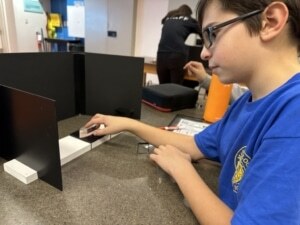
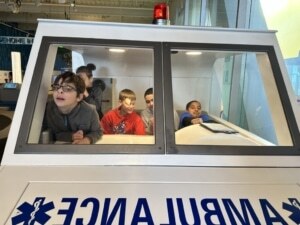
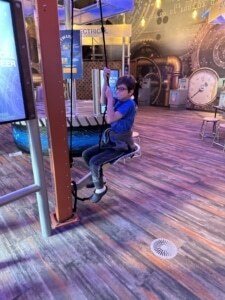
November 14, 2023
In search of the perfect bio
As someone who is asked quite often to provide a bio for an upcoming storytelling show, a literary festival, a corporate training session, a magazine piece, or, yesterday, for the “About the Author” section for my next book, I know how daunting this job can be.
Summarize your life in a paragraph or two. Don’t say too much, but don’t shortchange yourself, either. Also, put things in the proper order to list the most important aspects of you and your career first.
As someone who has a handful of jobs, this can be especially daunting.
What do I list first?
Elementary school teacher? Author? Storyteller? Consultant?
Many people see me as a teacher first and foremost, which makes sense. But many more, literally around the world, see me primarily as an author. Still others only know me as a storyteller or consultant.
And those are only the top four jobs. There is also wedding DJ, minister, comic, and columnist. I also own and operate StoryworthyMD, producing online storytelling courses for people and businesses.
How does one squeeze all that into one bio? And should you?
And do I include book titles? Or some book titles? If so, which ones? Do I include awards and achievements, and if so, which ones?\
Your bio can get pretty bloated pretty quickly if you’re not careful.
Last week, when I performed at the New York City Comedy Festival, the host asked for my bio, and I said, “Tell them I’m left-handed, allergic to bees, and always in need of a cheeseburger.”
She balked at first, knowing a lot about me. “You don’t want me to mention your books? All those Moth championships? The fact that you were teaching fifth graders a few hours ago?”
“Nope,” I said. “Just go with the single sentence.” In the end, she went with my request, and I kind of loved it. People laughed, which meant I got my first laugh without saying a word.
Not bad.
The host of a TED conference once introduced me as “one step above an idiot.”
I loved that one, too. Lots of laughter before I ever landed on the orange circle.
Neither of those laugh-inducing bios is suitable for my next book’s “About the Author” section, but they aren’t bad, depending on the circumstance.
Jeni Bonaldo recently sent me a bio for Elysha if we needed one for “Matt and Jeni Are Unprepared.” I thought it was perfect. Absolutely, positively spot-on. One of the best I’ve ever read.
Perhaps this is the secret to a good bio:
Have someone else write it. Years ago, my friend Charles wrote me a bio consisting of a single sentence. I recently found it and sent it to him, asking if he might consider revising it. At the time, I had published only two books and hadn’t yet begun my storytelling and performance career.
Things have changed since then.
Hopefully, he’ll take on the challenge, and if you would like to write a bio for me, I’d love to consider using it in the future.
Yes, I’m sloughing off another one of my jobs to other people. It’s not lazy. It’s called delegation.
For inspiration, here is Jeni’s bio of Elysha. Matching her brilliance will be difficult.
_____________________________________
Elysha Dicks is a wife, mother, kindergarten teacher, and Speak Up Storytelling host. She spends her days teaching children to read and do math and her nights dealing with the relentless optimism of her husband and the picky eating habits of her children, all while maintaining the dewy, perfect skin of a baby child.
She loves music and knows an impressive amount of musical trivia. She loves theater, quaint Connecticut towns, and drinking Starbucks at Target.
She wishes her husband could sometimes embrace the concept of a “lazy Saturday.”
She’s a proud Smithie, an expert ukulele player, and everyone’s favorite member of the Dicks family.

November 13, 2023
Great signage idea
Here’s my idea:
Put up a sign that announces something very appealing and fantastic. An event that would excite the masses.
List the date of the vent as “Yesterday.”
Wouldn’t that be fun?

November 12, 2023
Why are you rich but Charlie is not?
While chaperoning Charlie’s field trip to the Connecticut Science Center, a student asked me, “Why are you so rich, but Charlie isn’t?”
I was befuddled. I actually asked the boy to repeat himself.
“You’re rich, but Charlie isn’t,” he said. “How come?”
“What makes you think that?” I asked.
“You published a bunch of books and do comedy and stuff onstage and have a YouTube channel and TED Talks, so you must be rich, but Charlie doesn’t even have a phone.”
Crazy. Right?
And a great reminder about how perception and reality can be so different. The way the world views you is probably very different than the reality of your life.
People are almost certainly walking around with enormous misconceptions about you.
I explained to the boy that authors and storytellers and comics aren’t necessarily wealthy. “Not all authors are selling the same number of books,” I said. “And not every storyteller and comic and public speaker is raking in the dough.”
“Oh,” he said.
“And Charlie doesn’t own a phone because we don’t want him to own a phone. We care too much to give him unfettered access to a device designed to promote addiction and ultimate enslavement through the constant, relentless dispensing of dopamine and the anxiety-producing effects of social media.”
“Huh?” he said. Now, he looked befuddled.
“We’re mean parents,” I said. “We won’t let him have a phone.”
“Oh,” he said. “Poor Charlie.”
But not poor in a monetary sense anymore.

November 11, 2023
Worst par ever
On the fourth hole at Buena Vista golf course last week, a 150-yard par 3 from an elevated tee box, I hit my tee shot high and true.
It’s a hole I often play well. The elevation gives me an extra ten yards, allowing for an easy iron shot onto the green, and even if I come up short, I can often chip and putt for a par.
On this morning, I struck the ball especially well. As it approached the green, I worried it might go too far and get lost in the swamp and trees behind the green.
Instead, the ball hit the hole.
It went directly into the hole before ricocheting out at a high and crazy angle, landing more than 20 yards off the green.
I had nearly scored my first hole-in-one. The ball had actually entered the hole but failed to remain inside.
I was so devastated.
A few moments later, I chipped my ball from a patch of thick grass to the left of the green. The ball leaped off my club, hit the green, bounced once, and hit the hole, only to once again ricochet out and roll about 15 feet from the cup.
I couldn’t believe it. After hitting the hole with my tee shot, I once again hit the hole with a 20-yard chip, yet the ball was still 15 feet away from the pin.
Frustrated beyond imagination, I lined up my putt and dropped it into the hole for a par.
The most disappointing par of my life.
It was a good lesson:
The journey is often far more important than the actual goal, and sometimes, achieving the desired goal just isn’t enough.

November 10, 2023
A saloon for Charlie
Charlie is opposed to alcohol consumption of any kind, going so far as to cast aspersions at Elysha for enjoying a glass of wine at dinner from time to time.
This is why I asked Charlie to enter the saloon in the old-timey western town at a fall festival that we recently attended in Rhode Island.
Charlie didn’t know the meaning of the word “saloon.”
It’s also why I asked him to point at the saloon sign and give a thumbs-up.
He was quite annoyed with me when I finally showed him the photos and I explained the meaning of the word.
I told him that this is why we have children:
To entertain ourselves at their expense.
